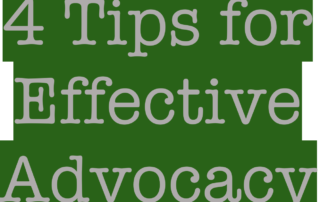**Following my recent webinar focused (ironically) on understanding ADHD, an attendee sent me a message asking for some guidance on how to be an effective advocate. After I responded, I thought maybe I would share it with everyone. This isn’t an exhaustive list, they’re just the first things that came to mind. Do Not Hide The most important place to start is to be out in the open. Talk about your ADHD in a matter-of-fact way. Share your story. You don’t have to work it into your conversation because it is your actual life. The best way to advocate is to educate. What you are educating people about is what ADHD looks like in everyday situations. Once we’ve sown the seeds of awareness, sometimes attraction is more effective than promotion. If all we ever do is advocate and educate then people won’t want to hear from us anymore. There’s an ebb and flow in this process. Everything is a teaching opportunity but not everything is a teaching moment. Find your People Join organizations that promote awareness like CADDRA, CADDAC, CHADD, etc. Follow FB pages or IG accounts that are devoted to building a sense of community within the ADHD world, not just lamenting the current conditions. […]
Taking Back Control
…nothing lasts forever (emotions, thoughts, and pandemics included).
ILYSM: Beware of Counterfeit Sentiment
The Danger of “Loving” Everyone So Much Here is a typical social media scenario. Person A posts selfie after 38 attempts to get the pose just right enough to look spontaneous and natural. Caption to selfie has no connection with selfie at all, just some brief commentary on what’s going on that day or moment. Person B sees selfie, doesn’t read caption, digitally likes the selfie (not the same as really liking it), and comments, “ILYSM”. For the uninitiated, those letters are short for “I love you so much”. This starts a cascade of ILYSMs that might number in the dozens or more. As you scroll through the comments, virtually no one has mentioned the caption. If satisfied with the response, Person A repeats the pattern later that day. If unsatisfied, Person A deletes the post, tries a different pose with unrelated caption, or a sympathy-seeking caption, and tries again. So why is ILYSM so dangerous? Because it is fool’s gold. The danger of mindlessly churning out over-the-top expressions of affection is not only that there is little substance to them, but that even more insidiously, it dulls a person’s ability to recognize genuine affection and fidelity. As Violet, from […]
Epigenetics: The Impact of Environment on Development
In new article published online in ADDitude Magazine, Dr. Joel Nigg reviews some recent findings on the impact of environment on the development of ADHD traits. Long thought to be strictly a genetically inherited brain dysfunction, increasing amounts of research (along with increasing amounts of attention paid to previous research) are demonstrating a clear link between ADHD development and the environment. This field of research, focusing on the link between genes and environment, is known as epigenetics. In this case, the prefix epi- refers to something beyond, over, or upon something else. In other words, epigenetics studies the factors beyond simple genetics (if there is such a thing as simple genetics) that influence the development of certain traits. In his article, Dr. Nigg states, “Epigenetics paints a much more complicated view of ADHD, but also a much more optimistic one; genes do not solely determine an individual’s fate.” For those who struggle with ADHD, the round pegs trying to fit into square holes, one of the bleakest aspects of daily life is the belief that things will always be this way and cannot be improved. Epigenetic research is telling us more and more that this belief is false. Nigg reports, […]
I Don’t Know Why: The Story of My Childhood
This is another excerpt from my book, “Teddy Hit Me”. Enjoy my pain… “When I was four years old, living in Castlegar, BC, my mom’s friend was over for a visit. With her she brought her son, another active four-year-old boy that I sometimes played with at church. We lived in a fairly rustic setting. OK, that’s an understatement; our backyard was a steep, tree-covered hill covered with dense bush. In other words, the perfect place for four-year-old boys to play completely unsupervised. The memory is a brief one but I remember standing above my playmate, slightly up the hill from where he was squatting and poking through the leaves and other foliage on the ground. Somehow, I ended up with a large rock in my hands. Yes, hands. It was big enough that it took two hands for me to lift it. I don’t remember if he looked at me at all, but there is a whisper of memory of him gazing up at me, where I stood holding the rock aloft, with a puzzled look on his face, as if questioning whether I was actually going to do what I appeared to be set to do. The answer […]
That Time I Pantsed Myself…
The following story is a brief excerpt from my book “Teddy Hit Me: Scattered Stories of an ADHD Life” (Currently in progress). I hope you enjoy my pain… You know how sometimes you might be watching TV while eating chips with dip and absent-mindedly dip the remote into the dip and try to change the channel with your chip? No? I’m sure some of you know what I’m talking about. My son just about brushed his teeth with Polysporin the other night because his mind was wandering somewhere else and reverted to its simple rule: squishy stuff in tubes go on the toothbrush. Anyway, when I was in grade 2, which seems to have been a fairly disastrous year, this tendency came back to bite me in a major way. There was this little girl, Gina, who sat in front of me, who, in retrospect, was seriously troubled. I remember being horrified one time as she turned around and said, “Hey Teddy, look at this.” and proudly displayed the thumbtack she had stabbed into her wrist. Anyway, one day after school, Gina was being scolded by the teacher, Mrs. Anderson, that picture of warmth who had spanked me loudly in […]
Book Excerpt: Impact of Fear on Recollection of Experience
The following is a very brief excerpt from my book, “This is Not That” due to be completed in 2048, based on the current pace. Let me know what you think. “In a rather complicated study, Professor D.B. Fenker and his colleagues (2005) had subjects view a series of emotionally neutral words on a computer screen. Randomly, some words were preceded by pictures of fearful faces or other disturbing images. The exposure to these images, however, was so quick that the individual was not aware that they had even seen the image, referred to popularly as subliminal images. Participants were later shown lists of words and asked to say whether they recalled seeing a word (had a conscious memory of learning it) or knew they had seen the word (they knew they had seen it before but couldn’t remember where or when). The researchers found that when words were preceded by a frightening or unpleasant image, they were more accurately recognized, though not consciously recalled. The implications of this study, and others like it, are momentous. If the brain is so sensitive to negative stimulation as to react in such a powerful way to such an insignificant trigger, imagine its […]
Perspective: The Gatekeeper
Often we are hard on ourselves when we don’t need to be, particularly when it comes to how much things that have happened to us continue to affect us. We like to think that we can just let things go, move on, and get over it but that’s just not how things actually work. Our past experiences continue to affect our current perception of events unless we actively try to overcome this natural tendency. Similarly, it is very difficult for a tall building to stand straight when the foundation is crooked. The only way to straighten the building is to work on the foundation, not the 30th floor. Often, when discussing current struggles with my clients, they will remark that they feel a lot of anxiety or depressed feelings “for absolutely no reason”. This is rarely the case. It is more accurate to say that they are feeling anxiety for no known reason, or no current reason. There’s always a reason. One way that is helpful for people to unlock the true impact of the past on their present is to get them to see it from outside of themselves. No, this does not involve high doses of hallucinogenic mushrooms, […]
Fighting Back Against Negativity
Our brains are wired to look for the negative. Why is this? Stated simply, it’s about survival. Think about it: if you lived in the jungle and on your way home at the end of the day, if you didn’t stop to notice the pretty flowers, would it endanger you? No. But, if you didn’t notice the poisonous snake or the scary tiger or the cave-to-cave salesman, then you might actually be in danger. Thus, it is advantageous to our survival to keep an eye out for negative, unsafe, dangerous things. However, we don’t live in the jungle anymore and the threats to our survival aren’t quite as literal anymore. We haven’t yet gotten rid of this natural instinct however; it has just transferred to other threats, social threats. We look for signs of rejection, exclusion, not belonging, not measuring up, etc. We do so because belonging to the group equals safety. Or at least it used to; that’s another fossil from our pre-industrialized past. With the development of cities and technology, a man can actually be an island and survive. I’m not saying he will be the happiest man, but he will be alive. So, how do we overcome […]













Recent Comments